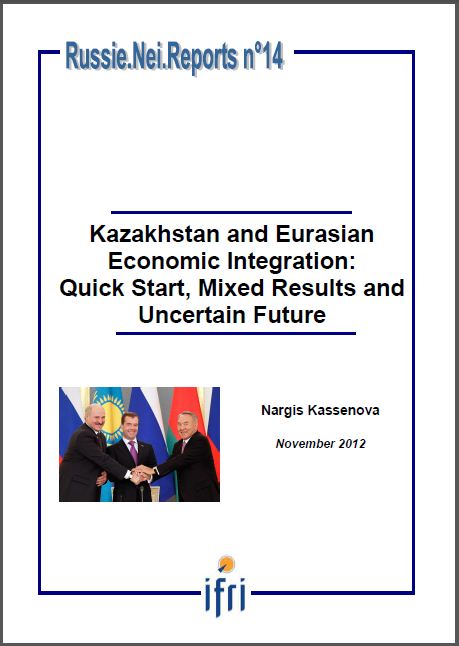Kazakhstan and Eurasian Economic Integration: Quick Start, Mixed Results and Uncertain Future

Kazakhstan's economic integration with Russia and Belarus has been advancing at break-neck speed.
In October 2007, these countries signed a treaty on the creation of the Customs Union (CU), in July 2010 the unified Customs Code went into effect, and in July 2011 customs controls were removed from the borders between member-states. In January 2012, Moscow, Astana and Minsk introduced the Single Economic Space (SES) based on “freedoms” of movement of goods, services, capital and labor to be implemented by 2015. While a union with Russia has been always an official priority, other trade integration alternatives have been pursued by the Kazakhstani government as well. The one that was in strong competition with the CU option was the prospect of joining the WTO and this way advancing Kazakhstan's integration with global markets and making the country's economy more competitive. The analysis of the possible motives (economic, political and geopolitical) explaining why Kazakhstani leadership privileged integration with Russia over joining the WTO shows that economic reasons emphasized in the official discourse did not play the main role. Political reasons (primarily, the concern with security) seem to have been more prominent.

Available in:
Regions and themes
ISBN / ISSN
Share
Download the full analysis
This page contains only a summary of our work. If you would like to have access to all the information from our research on the subject, you can download the full version in PDF format.
Kazakhstan and Eurasian Economic Integration: Quick Start, Mixed Results and Uncertain Future
Related centers and programs
Discover our other research centers and programsFind out more
Discover all our analysesRussia, the Palestinians and Gaza: Adjustments after October 7th
The Soviet Union (USSR), and subsequently the Russian Federation as its internationally recognized legal successor, has consistently sought to play a visible role in efforts to resolve the Israeli-Palestinian conflict.
Deathonomics: The Social, Political, and Economic Costs of War in Russia
The report attempts to outline and examine a truly new phenomenon in Russian society, dubbed “deathonomics”—the making of a mercenary army against the backdrop of the Kremlin’s war in Ukraine, eventually replacing both the Soviet (conscript) and early new Russian (contract) armies. It notes that, by the end of 2023, this trend had turned the military service into one of the highest-paying professions in the country, something not seen in Russia on such a scale since the late 17th century.
Russia's Asia Strategy: Bolstering the Eagle's Eastern Wing
Among Russia’s strategic priorities, Asia traditionally played a secondary role compared to the West. In the mid-1990s, then Foreign Minister Yevgeny Primakov initiated a rapprochement with China and India. Then, in 2014, deteriorating relations between Russia and the West prompted Moscow to begin its “great pivot to the East”.
Kazakhstan After the Double Shock of 2022: Political, Economic and Military Consequences
The year 2022 represented a dual shock for Kazakhstan. In January, the country faced its most severe political crisis since independence, followed in February by Russia’s full-scale invasion of Ukraine, which cast uncertainty over the borders of post-Soviet states. These consecutive crises profoundly shaped Kazakhstan’s domestic and foreign policy.










